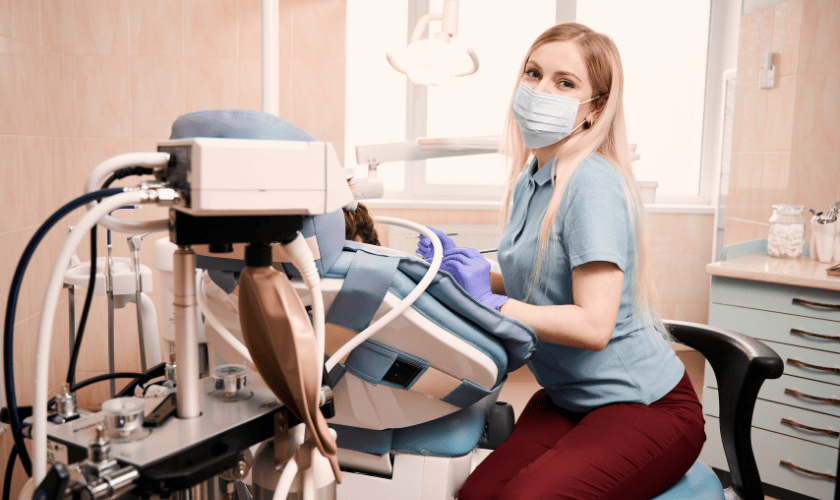
Are you someone who dreads going to the dentist? Do you experience anxiety and fear just thinking about it? If so, sedation dentistry might be the solution for you. However, not everyone is a good candidate for sedation dentistry. In this blog post, we will discuss the five qualities that one should look for in the right candidate for sedation dentistry. By understanding these qualities, you can determine if sedation dentistry is right for you and find a qualified dentist who can provide safe and effective treatment. So let’s dive in!
A Person Should Be A Good Candidate For Sedation Dentistry If They Have Realistic Expectations And Are Willing To Make Some Sacrifices
Sedation dentistry is an effective way to help people manage their anxiety and fear when visiting the dentist. However, it’s important to note that only some are good candidates for sedation dentistry. One essential quality for a person to be considered a good candidate is having realistic expectations for the procedure.
It’s unrealistic to expect sedation dentistry to eliminate all discomfort or pain during dental procedures. While patients may feel more relaxed and comfortable, they should still expect some level of discomfort during certain treatments.
Another factor that makes someone a good candidate for sedation dentistry is their willingness to make sacrifices to undergo the procedure safely. This includes avoiding food and drink before the appointment as directed by the dentist, making arrangements for transportation home after the appointment if necessary, and following any other instructions provided by your dental team.
Ultimately, having realistic expectations and being willing to make sacrifices are crucial qualities in determining whether or not someone is suitable for sedation dentistry. Patients must have open communication with their dentist about what they can realistically expect from this type of treatment so that they can fully understand what will happen during their visit.
The Candidate Should Be Able To Handle General Anesthesia With No Adverse Effects
When it comes to undergoing sedation dentistry, the candidate’s ability to handle general anesthesia is an essential factor. General anesthesia puts a patient into a deep sleep, which allows for more complex dental procedures to be performed without causing discomfort or anxiety. However, not everyone can handle general anesthesia with ease.
The ideal candidate should have no adverse effects from previous experiences with general anesthesia. They should also provide their dentist with detailed information about their medical history and any medications they are currently taking. This will help the dentist make informed decisions about administering sedatives safely and effectively.
It’s important to note that certain health conditions can increase the risks associated with general anesthesia. Therefore, candidates must disclose any underlying health problems such as heart disease or diabetes before undergoing sedation dentistry.
Dentists must evaluate each patient carefully before determining if they are suitable candidates for sedation dentistry involving general anesthesia. If there are any concerns regarding the patient’s ability to tolerate this type of sedative approach, other options such as local numbing agents or oral medication may be considered instead.
Being able to handle general anesthesia is crucial in choosing an appropriate candidate for sedation dentistry procedures. It ensures safe administration and effective results while minimizing potential risks associated with deep sleep induced by strong anesthetics like Propofol or Ketamine- two commonly used drugs in dental surgeries requiring full relaxation of patients’ muscles during treatment sessions
They Should Not Have Any Major Mental Health Issues That Would Prevent Them From Undergoing Sedation Dentistry
Having good mental health is important in our daily lives, and even more so when it comes to undergoing medical procedures. This holds for sedation dentistry as well. Candidates who are considering sedation dentistry should not have any major mental health issues that would prevent them from safely undergoing the procedure.
One of the most common concerns concerning mental illnesses is anxiety or panic disorders. People suffering from these conditions may find it difficult to cope with the idea of being unconscious while having dental work done. Additionally, some medications used in sedation dentistry can interact negatively with certain psychiatric drugs.
Other factors affecting a patient’s ability to undergo sedation dentistry include depression, bipolar disorder, schizophrenia, and substance abuse disorders. These conditions need to be managed carefully before considering any kind of anesthesia or conscious sedation.
Patients need to disclose their full medical history – including any current medication they are taking – to their dentist before scheduling an appointment for sedation dentistry. This will enable the dentist to evaluate whether a candidate is suitable for treatment using general anesthesia or other forms of conscious sedation.
Although there are risks associated with all forms of anesthesia and conscious sedation – having good physical AND mental health can help reduce those risks significantly when it comes time for your dental visit!
Dentists Should Be Confident In Their Ability To Administer General Anesthetics And Sedatives Safely And Effectively
The dentist plays a critical role in ensuring the safety and success of sedation dentistry. They must have the necessary expertise, experience, and training to administer general anesthetics and sedatives safely and effectively.
A confident dentist should be knowledgeable about the different types of sedation dentistry available and how each one works. They should be able to explain clearly to their patients what to expect during treatment, including any potential risks or side effects.
In addition, a skilled dentist will carefully evaluate each patient’s medical history before recommending any form of sedation. This includes assessing factors such as age, weight, allergies, and medications taken regularly or recently discontinued.
Moreover, they should monitor vital signs throughout the procedure continuously while keeping an eye on oxygen levels in your blood pressure level. Doing so can help them quickly detect any adverse reactions or complications that may arise during treatment.
Finally yet importantly – it’s crucial for a qualified dental professional always to follow strict guidelines when administering anesthesia or other forms of sedation. These guidelines are designed for both patient safety as well as protection against legal liability if anything goes wrong during treatment.
Overall – choosing a competent dentist with extensive knowledge in Sedation Dentistry is critical not only for comfort but also for peace of mind!
Finding the right candidate for sedation dentistry is a crucial step in ensuring successful outcomes and patient satisfaction. It requires careful consideration of various factors such as medical history, mental health status, and realistic expectations.
By looking for candidates who possess the qualities discussed in this article – such as the ability to tolerate general anesthesia without adverse effects, a lack of serious mental health issues, and a dentist’s confidence in administering sedatives safely – you can increase your chances of achieving optimal results.
Ultimately, it all comes down to proper communication between you and your dentist. By discussing your concerns openly with them and providing them with accurate information about your medical history, you can work together to determine whether or not sedation dentistry is right for you.
So if fear or anxiety has been preventing you from getting the dental care that you need, consider exploring this option further. With the help of an experienced dentist who specializes in sedation dentistry and by keeping these key qualities in mind when selecting a candidate for treatment, there’s no reason why you can’t achieve a healthy smile that lasts a lifetime!




